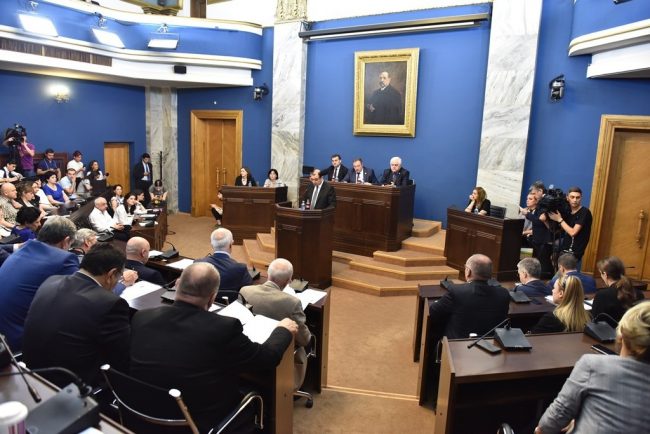
 The ruling Georgian Dream Party’s candidate for prime minister, Mamuka Bakhtadze, has submitted a list to Parliament for an updated ‘temporary’ cabinet, which he said would be revised after several weeks. The PM-designate also announced that he will cut the number of ministries from 14 to 11.
The ruling Georgian Dream Party’s candidate for prime minister, Mamuka Bakhtadze, has submitted a list to Parliament for an updated ‘temporary’ cabinet, which he said would be revised after several weeks. The PM-designate also announced that he will cut the number of ministries from 14 to 11.
Parliament has until Wednesday to confirm a new cabinet after Giorgi Kvirikashvili resigned as prime minister on 13 June over disagreements with party chair Bidzina Ivanishvili.
‘Technical cabinet’ under fire
Ministerial nominees made speeches in Georgia’s Parliament on Tuesday before a vote of confidence on the new cabinet on Wednesday. Georgian Dream MP Davit Chichinadze described the new cabinet as a ‘technical cabinet’, meant to be short-lived. Bakhtadze said that a final government set-up and updated cabinet would be re-submitted later for approval, in 2–3 weeks time.
Several Georgian Dream leaders have argued that this move is necessary because structural changes as part of Bakhtadze’s ‘smaller government’ initiative will take weeks to complete, and the Constitution obliges them to submit a new cabinet to Parliament within a week of Kvirikashvili’s resignation.
The concept of a ‘temporary’ cabinet came under fire from a number of opposition parties.
‘I can remember many interim governments from history, but none with a three-week expiration date’, Sergo Ratiani, an MP from the opposition European Georgia told Rustavi 2.
Parliamentary opposition parties the United National Movement and European Georgia said they will vote against the new cabinet.
Former Parliamentary Speaker Davit Usupashvili urged ‘someone to give a copy of the constitution to the government, or to the candidate for prime minister’. ‘Even a bakery isn’t run this way’, said Usupashvili.
President Margvelashvili was among the first to react to Bakhtadze’s ‘interim’ cabinet. ‘This masquerade of selecting prime ministers has to end’, he said during a speech at the 15th Georgia’s European Way conference on 14 June. He then called on the ruling party ‘to appoint Bidzina Ivanishvili as the Prime Minister’.
Ivanishvili has faced continued allegations of informally ruling the country since his resignation as Prime Minister and official retirement from politics in late 2013. He made a return to frontline politics in May, when Georgian Dream, the party he founded, elected him as chairman amidst reports of intra-party tensions.
Ministries cut
According to Georgian TV channels Imedi and Rustavi 2, Bakhtadze plans to cut the ministries of corrections, IDPs, and culture, merging their functions into other ministries.
The Ministry of Corrections and Probation, currently headed by Kakha Kakhishvili, will allegedly become a part of Ministry of Justice. Acting Justice Minister Tea Tsulukiani has come under increasing pressure from leading local non-governmental organisations, who have said that due to ‘failed reforms’, they do not want to see her in the new government.
Her resignation, and that of Interior Minister Giorgi Gakharia, were also demanded in early June by Zaza Saralidze, the leader of recent anti-government protests. In a speech in Parliament on Tuesday, Tsulukiani called on ‘absolutely everyone’, including ‘non-governmental organisations’ and ‘opponents’, to get involved in consultations on selecting a new Chief Prosecutor. She also expressed dissatisfaction that ‘there is only one female candidate’ for the position.
The Ministry of Internally Displaced Persons from the Occupied Territories, Accommodation, and Refugees will allegedly be split in two and formally disbanded. The Health Ministry and the Ministry of Infrastructure will reportedly absorb its current functions. Minister of IDPs Sozar Subari has been part of the Georgian Dream government since it came to power, occupying his current post since 2014 after serving as Minister of Corrections for two years. Minister of Regional Development and Infrastructure of Georgia Maia Tskitishvili is among the latest newcomers and, according to some local media sources, is being considered as a potential candidate for president. Presidential elections are due in October.
The Ministry of Culture and Sport will allegedly be merged into the Ministry of Education and Science, headed by Mikheil Giorgadze.
All three acting ministers whose offices are reportedly planned to be terminated were present at the parliamentary hearing. According to local media, none of the candidates for cabinet positions have confirmed that they would be a part of the later, final government, which Bakhtadze has said would be announced after several weeks.
However, acting Interior Minister Giorgi Gakharia said it was ‘an honour’ to speak to Parliament ‘for the second time’, adding that he would ‘probably’ have to do so for a third time too. He also announced a raise in police officers’ salaries by ₾250 ($102).
The interim cabinet put before Parliament on Tuesday included only three new ministerial candidates: Davit Zalkaliani as Foreign Minister to replace Mikheil Janelidze, Giorgi Cherkezishvili as Minister of Economy to replace Dimitri Kumsishvili, and Nikoloz Gagua as Finance Minister to replace Bakhtadze once he becomes PM.
During the parliamentary hearing on Tuesday, Zalkaliani said it was Janelidze’s ‘personal decision’ to leave his position.
‘Small government’
On 18 June, Bakhtadze expanded on the concept of ‘small government’, something he had highlighted in his first speech in the capacity of a PM candidate, as one of four principles he intends to implement.
Bakhtadze claimed the idea of ‘small government’ is not limited to reducing government bodies, but also involves keeping the government expenditures ‘under 3.9% of GDP’. He said he hoped to save ₾100 million to ₾120 million ($41 million to $49 million), ‘which would be redirected to social programmes’.
The 36-year-old, currently acting Finance Minister, was nominated by Georgian Dream last Friday, two days after PM Giorgi Kvirikashvili resigned on 13 June, automatically suspending the whole cabinet.




 19 June 2018
19 June 2018


